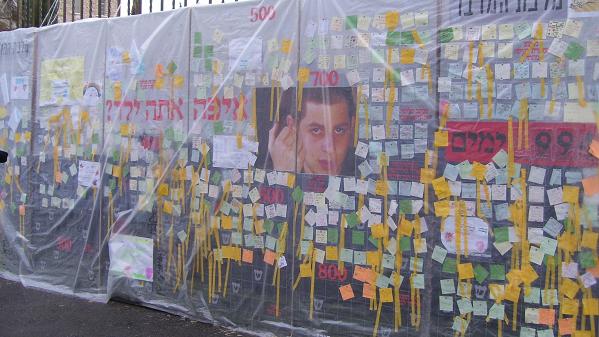Like Gilad Shalit, I am 25 years old. But the past five years of my life have been lived in relative freedom. I have been fortunate to complete my degree, find steady work, travel a bit, go out with friends, spend time with family, and embark on a solid start to life. When I first moved to Israel seven years ago, I never expected, among many things, that much of that time would also be spent praying and protesting for the freedom of an Israeli soldier held hostage in such close proximity to the Jewish state.
On the other side of Israeli border, in Gaza, Gilad Shalit spent those five years completely cut off from his family and country, held hostage by the terrorist group, Hamas, which contrary to international law, refused to allow any visitations from the International Red Cross. The only contact the kidnapped soldier had with the outside world was an audio tape and a DVD showing that he was alive, which Israel received in exchange for releasing 20 female Palestinian prisoners two years ago.
The saga of Gilad Shalit touched Jewish communities around the world including my home state of Maine, where the synagogue in Bangor, which my parents belong to, Beth Abraham, would recite a special prayer for Gilad on the Sabbath and holidays. Shalit was in the hearts and minds of people everywhere, as well as on bumper stickers and yellow ribbon bracelets across Israel, symbolizing that the captured soldier was alive and would not be forgotten.
(A wall full of notes written to Gilad Shalit in Jerusalem. Photo: Anav Silverman)
To the elation of many, this past week the news broke that a deal had been reached and Gilad was coming home. Passing by the Shalit tent in Jerusalem, across the Prime Minister’s residence, where activists and Gilad’s family were stationed for much of the five years, it seemed as if there was a cloud of happiness descending upon all those who were actively engaged in supporting his release. Cars peeped their horns, people waved as they drove by, and even the press was smiling.
But of course the joy didn’t last long because in this country, there is always a price that follows a few moments of relief and elation.
The price for Gilad Shalit’s return home turned out to be significantly heavy. According to Sunday’s confirmed list published by the Israel Prison Service, 1,027 Palestinian prisoners will be freed. Among them is Nasser Yataima, who was convicted of planning a suicide bombing which killed 30 civilians and wounded 140 during a Passover Seder in the Park Hotel in Netanya in 2002. The list also includes Husam Badran, who headed the 2001 bombing of a Tel Aviv nightclub, the Dolphinarioum, where 21 youths were murdered and the Matza Restaurant bombing in Haifa, where 14 civilians were killed.
Other terrorists included Hamas member, Yehieh Sinwar, who was sentenced to five life sentences for his role in the kidnapping and murder of Sgt. Nachshon Wachsman. Sinwar is the brother of one of the Hamas men who planned Gilad Schalit’s kidnapping and is also a founding member of Hamas’s military structure in Gaza.
Another woman scheduled to be released, Ahlam Tamimi, drove the suicide bomber who carried out the attack at the Sbarro restaurant at the corner of King George Street and Jaffa Road in Jerusalem. The bombing killed 16 people including five members of the Schijvenschuurder family in August 2001. Attorney Meir Schijveschuurder, who lost his parents and three siblings in the Sbarro suicide bombing stated back in March 2009 when a Shalit deal seemed close, that if Tamimi was ever released in a deal, he would personally take justice into his own hands.
While top terrorist and Fatah official, Marwan Barghouti was not on the list, much to the relief of many Israelis, his tenure at prison for murdering Israelis during the second intifadah, has been a rather unusual experience. Barghouti, 50, was able to finish his doctorate degree in political science just last year in March 2010.
He was enrolled at the University of Cairo and the Arab Academy for Research and Studies and was able to continue his research during his jail time thanks to the hundreds of books and documents that Israeli authorities allow inmates to bring into prison. This experience was not unique to Barghouti alone. Several hundred Palestinian prisoners held in Israeli jails enroll in studies at universities around the world including Israel’s Open University which facilitates their studies by allowing them to sit exams in jail.
Gilad Shalit had none of these opportunities while he was held in Gaza. Hamas boasted that the kidnapped soldier was not even permitted to exercise in sunlight. Shalit was not a terrorist, but a soldier on guard duty defending sovereign Israeli soil when he was abducted at the Kerem Shalom Crossing in southern Israel.
Speaking on Israel Television, Yehudit Shachor, whose son Uri was killed in a terror attack while hiking with a friend in Wadi Qelt in 1995, said that while she was happy for the Shalits, “I wish I could be happy as a mother with my child could coming home. But that is not going to happen. I am also very fearful because I know these terrorists will continue to murder and the same thing will happen in the future. I truly hope that Netanyahu knows what he is doing.”
While we thankfully no longer need to pray for Gilad Shalit’s safe return to Israel from Gaza, we will continue to carry the fears of those Israelis who were and will be impacted by the Palestinian terrorists who were freed on Tuesday.











